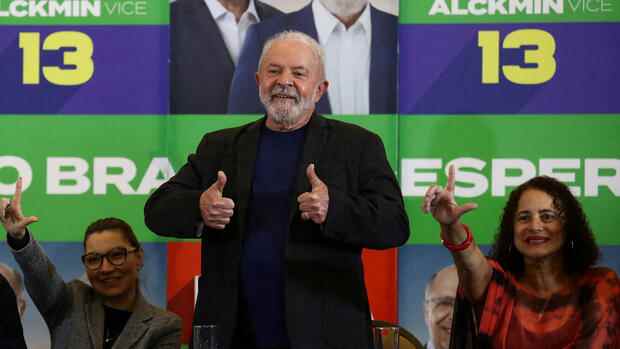The ex-president is ahead after the first round of the presidential elections – and is the favorite of international investors.
(Photo: Reuters)
Sao Paulo When the stock exchanges and financial markets in Brazil opened after the elections, they initially made a big jump: the Brazilian stock market index rose by six percent. The shares of state-owned companies in particular experienced unexpected price gains.
The oil company Petrobras and Banco do Brasil increased – as did companies that are controlled by states, such as the electricity company Cemig (up eleven percent) or the water suppliers Sabesp (up 17) and Copasa (up 19).
Ex-President Luiz Inácio Lula da Silva won the first round of the presidential elections by a wide margin. However, at five percentage points, the difference was far smaller than initially expected from the surveys. In the general elections held at the same time, President Jair Bolsonaro’s right saw a nationwide landslide victory in Congress and the states. This mix seems to please the markets.
The financial markets reacted positively: the dollar lost four percent against the real, the sharpest depreciation since 2018. Risk premiums on Brazilian bonds fell below 300 basis points. This means that investors demand less than a three percent interest premium (compared to US bonds) when they buy Brazilian bonds. This makes Brazil the only emerging market where government bonds have become significantly cheaper.
Top jobs of the day
Find the best jobs now and
be notified by email.
In other words, investors are more confident than before that the next government will be able to pursue sensible policies for the economy and the national budget. Investment banks like JP Morgan expect that the good mood on the financial markets could continue.
Brazil: Investors hope for left-right mix
There are mutliple reasons for this. For example, Marcos Casarin of Oxford Economics believes “this likely combination of a charismatic, progressive leader, Lula, and a conservative Congress represents almost a best-case scenario for the markets.”
>> Read also: Between awakening and the abyss – Brazil is also voting on its future
Investors are happy that Lula could end Brazil’s isolation in the world and make the country socially acceptable again – after right-winger Bolsonaro, who has largely isolated himself in the West with environmental destruction in the Amazon region, insults by European politicians and his demonstrative friendship with Vladimir Putin.
Lula could quickly open up the clogged sources of finance abroad. Environmental aid, but also capital for infrastructure projects from pension funds and multilateral donors such as the World Bank or KfW could flow to Brazil much more easily. Also, corporations do not have to justify themselves to their shareholders or customers if they want to invest in Brazil.
The far-right president has largely isolated Brazil on the international stage.
(Photo: Reuters)
On the other hand, with the conservative Congress and many states in the hands of Bolsonaro confidants, Lula has been put in charge of powerful controllers: he has to negotiate, form coalitions and cannot simply govern.
A revision of the labor legislation or the privatization of the state-owned electricity company Eletrobrás, as Lula has repeatedly mentioned in recent months, now have little chance. “A left-wing government should not have as many degrees of freedom and would probably have to moderate the economic agenda,” says JP Morgan.
Lula has to make concessions to the economy
So Lula didn’t get the blank check for his government he had hoped for with a first-round win. Now he will have to make concessions to the political center and the economy in order to win votes. He may introduce an economic cabinet to build trust among entrepreneurs. His economic program has also been very vague so far.
Investors are also positive that in states such as São Paulo or Minas Gerais the Bolsonaro supporters in the governorships could make further privatizations or capital increases of state-owned companies possible. Numerous shares in state-owned companies are now benefiting from this.
Nevertheless, from the point of view of the economy, a worst-case scenario has also come closer. According to Oxford Economics, that would be a victory for Bolsonaro. “Bolsonaro’s growing support in Congress could allow him to fire Supreme Court justices, potentially allowing him to dissolve Congress and suspend free elections if he so chooses,” Casarin fears. In four weeks, investors will see things more clearly, then the Brazilians will finally vote on their new president.
More: Peaceful transfer of power not certain – Brazil fears a coup
